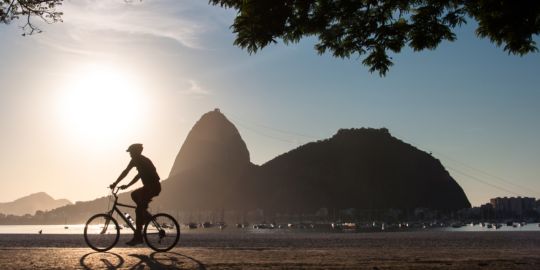Hello,
Moving to a new place and learning about the culture goes beyond adapting to customs and traditions. The art scene (music, art, literature, and cinematography) is also a big part of discovering a new country.
What are the best ways to learn about the cultural scene in Brazil, and how important are the arts in the country?
Did you do a lot of research prior to moving, or was it easy to explore the art scene after your move?
How would you explain the art scene in Brazil? What is the most salient art form in the country, that you would recommend for future expats to explore in order to adapt and integrate faster: literature, cinematography, music, etc.?
Which art form and artist most represent the country's culture, and why?
Are there certain activities or places such as art centres that would help to explore the culture in Brazil?
Thank you for sharing your experience,
Priscilla
How to discover the cultural scene in Brazil
What cultural scene?
When I think of Brazil, the first thing I think of is music. There's music of all kinds here, at all hours, everywhere. When we open our windows at night, we can always hear music coming from two or three directions, and four or five on the weekends. Discovering it is easy: a lot of the time, especially during Carnaval, you just have to follow your ears.
All of the state Culture Departments that I know of have programs, with free or reduced cost admissions, all through the year. Here in Amazonas, the state government makes an admirable effort to see that Teatro Amazonas, the world famous Opera House, never goes dark again. With the Amazon Symphony, the annual Opera Festival, and various musical performances, there's something going on almost all the time.
Now that the June Holidays are just around the corner, there will be a lot of festivals with dancing and traditional foods, both in the capitals and in the interiors. In the North and Northeast, there's Boi-Bumbá -- people have been practicing all year, and the practices are fun parties; the festival itself should be over the top. These things and many more are easy to find on the Internet.
Debates
WILL BRAZIL'S CULTURAL SCENE THRIVE DESPITE RECESSION?
SEE COMMENTS ^
MODERATOR
Charlotte Burns
Charlotte Burns
JANUARY 27, 2016
Brazil was booming for the first decade of the new century. In 2001, it was christened as one of the four BRIC nations along with Russia, India, and China. The acronym was coined by Jim O'Neill, the chief investment officer of Goldman Sachs, and seemed to mark the shift in global economic power away from the G7 nations to newly advancing countries.
Brazil, the world's eighth largest economy, seemed in prime position to gain strength. The country's enviable natural resources and its late entrance on the oil-exporting stage seemed sure to secure its position as a nascent economic powerhouse. In 2010, the country's growth rate was 7.5%—the highest in 25 years.
Social changes were starting to take effect, as well. The South American giant's transition from dictatorship to democracy created a rising middle class whose spending power grew in tandem with its increased stability.
Where economies emerge, the art market follows. Voted the art world's “it country” by Art Review in 2012, Western dealers began a courtship of the country's culturally minded by opening galleries, taking local artists on board, and participating in art fairs in São Paulo and Rio.
A new generation of collectors emerged, such as the mining magnate Bernardo Paz, who transformed a huge swath of land in Minas Gerais into the Centro de Arte Contemporânea Inhotim, an art mecca where enormous and ambitious projects have been realized.
The appetite was not confined to collectors: Brazil's museums regularly topped The Art Newspaper's annual attendance survey as more members of the Brazilian public than in any other country visited exhibitions.
But now Brazil's economy has fallen into recession. The annual rate of inflation rose above 10% in November 2015 to a 12-year high, which is likely to cause more austerity. The country's credit rating was downgraded to junk status in September by Standard & Poor's, while its currency fell almost 30% against the dollar in 2015.
Unresolved structural problems, convoluted taxes, and complicated regulations have hampered the country's growth while corruption scandals threaten to topple it. The arrest of star Brazilian banker André Esteves, the chief executive of Grupo BTG Pactual, on 25 November 2015 as part of the investigation into the state-owned oil company Petrobras (also known as operation lava jato, or car wash) saw the real fall a further 1.9% against the dollar to R$3.77.
Where does the recent economic turmoil leave the cultural sphere? The romance with the international art trade seems to have cooled off: Western galleries including White Cube have withdrawn from the region. As the currency spirals, local collectors are feeling less liquid as disposable income shrinks. Institutions are already feeling the effects of the funding squeeze with many major museums canceling or postponing exhibitions.
For the first part of this century, Brazil's cultural sector showed the potential to be truly great. Will it maintain momentum despite the broader problems the country is facing?









